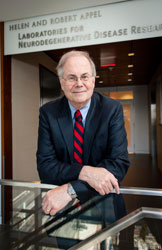Parkinson’s Disease Topic of June 26 MBL Friday Evening Lecture

WOODS HOLE, MA–The Earth’s population is aging fast, and the coming sharp increase in the number of people over age sixty-five will bring with it an epidemic of age-related neurodegenerative diseases, such as Alzheimer’s and Parkinson’s diseases. Currently, no cures exist for any of the major neurologic disorders. Unless cures can be found, by 2050 the cost of these diseases will exceed $1 trillion annually in the United States alone.Neurobiologist Gregory Petsko of the Weill Cornell Medical College will discuss his research to identify the events that initiate Parkinson’s and to develop new approaches for preventing or arresting the disease at the MBL (Marine Biological Laboratory) Friday Evening Lecture, Friday, June 26. His lecture, “How Parkinson’s Disease Starts – And How It Might Be Stopped,” will be held at 8:00 PM in the MBL’s Lillie Auditorium, 7 MBL Street, Woods Hole. The event is free and open to the public.

Petsko is the Arthur J. Mahon Professor of Neurology and Neuroscience at Weill Cornell Medical College, and Director of the Helen and Robert Appel Alzheimer’s Disease Research Institute. He also holds appointments as Professor of Biomedical Engineering at Cornell University, Adjunct Professor of Neurology at Harvard Medical School, and Tauber Professor of Biochemistry and Chemistry, Emeritus, at Brandeis University. He received his B.A. from Princeton University and his D. Phil. from Oxford University.
Petsko’s research interests include protein structure and function and the development of methods to treat age-related neurodegenerative diseases, including ALS (Lou Gehrig’s), Alzheimer’s and Parkinson’s diseases. He has been elected to the National Academy of Sciences, the Institute of Medicine, the American Academy of Arts and Sciences, and the American Philosophical Society.
Petsko’s public lectures on the aging of the population and its implications for human health have attracted a wide audience on the Internet (one of his TED talks, for example, has been downloaded over 600,000 times). For the past twelve years he has also written a widely-read and much reprinted column on science and society, the first ten years of which have just appeared in book form.
The Friday Evening Lecture Series will continue throughout the summer at the MBL. The remaining lectures in the series are below. For more information, visit mbl.edu/FEL
July 3 - Segal Lecture - “Life Interrupted: Exploring the World of Extreme Adaptation” – Jonathan Gitlin, Marine Biological Laboratory
July 10 - “The Invisible Influence of the Microbiome” – Jack Gilbert, University of Chicago
July 17 - Forbes Lecture - “Electrical Signaling: Life in the Fast Lane“ – William Catterall, University of Washington
July 24 - Porter Lecture – “Development of External Genitalia: From Evolutionary Origins to Congenital Malformations” – Martin Cohn, University of Florida; Howard Hughes Medical Institute
July 31 - E.B. Wilson History and Philosophy of Science Lecture – “Why We Should Trust Science: Perspectives from the History and Philosophy of Science” – Naomi Oreskes, Harvard University
August 7 - Director’s Lecture – “Microbial Dark Matter” – Edward Rubin, Department of Energy Joint Genome Institute
August 14 - Glassman Lecture – “Ecology in a Human Biosphere” – Erle Ellis, University of Maryland, Baltimore County
—###—
The Marine Biological Laboratory (MBL) is dedicated to scientific discovery and improving the human condition through research and education in biology, biomedicine, and environmental science. Founded in Woods Hole, Massachusetts, in 1888, the MBL is a private, nonprofit institution and an affiliate of the University of Chicago.